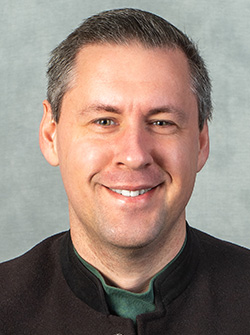Joseph Harris

Assistant Professor
Bradley Hall 79
(309) 677-2589
jharris2@bradley.edu
Ph.D. Psychology and Neuroscience, Duke University
Biography
Dr. Harris received his Ph.D. from Duke University under the mentorship of Dr. Marty Woldorff. His thesis examined the automaticity of face processing using non-invasive electrophysiology (event-related potentials). During his graduate studies, he gained expertise in the myriad ways a physically present image can be rendered perceptually invisible, and his experiments have used the attentional blink, motion-induced blindness, and various forms of visual masking. Additionally, he had the opportunity to work with a variety of cognitive neuroscience methods, completing lab rotations with Dr. Stephen Mitroff specializing in psychophysical measures and visual cognition, and with Dr. Jennifer Groh, employing intracranial electrophysiological recording and stimulation techniques in non-human primates. From Duke, Dr. Harris relocated to Germany, where he worked as a postdoctoral researcher in the Department of Neurology at the Otto-von-Guericke University in Magdeburg with Dr. Ariel Schoenfeld and Dr. Hajo Heinze. There, the focus of his research expanded to include the neural correlates of motivated behavior and craving.
Teaching
Dr. Harris has experience covering course material in psychology and cognitive neuroscience, and currently teaches Brain and Behavior, Quantitative Methods, and Principles of Psychology at Bradley University.
Scholarship
Dr. Harris’ research is motivated by the idea that visual information in the brain, whether or not a viewer is aware of it, has the potential to influence behavior, and that such subliminal processes can be examined using non-invasive event-related potential measures of brain activity. His current focus is the role of automatic attentional capture toward unseen motivationally-relevant images, and how this might promote normal motivated behavior, such as eating, or undermine efforts to cease less adaptive behaviors, such as substance use. Aside from subliminal visual processing, Dr. Harris is interested in the interpretive nature of perception, and how the brain manages build an effective understanding of the world on the basis of limited sensory evidence, predictions, and assumptions.
Selected publications
Harris, J. A., Donohue, S. E., Ilse, A., Ariel Schoenfeld, M., Heinze, H. J., & Woldorff, M. G. (2018). EEG measures of brain activity reveal that smoking-related images capture the attention of smokers outside of awareness. Neuropsychologia, 111, 324-333.
Harris, J. A., Donohue, S. E., Schoenfeld, M. A., Hopf, J. M., Heinze, H. J., & Woldorff, M. G. (2016). Reward-associated features capture attention in the absence of awareness: Evidence from object-substitution masking. Neuroimage, 137, 116-123.

